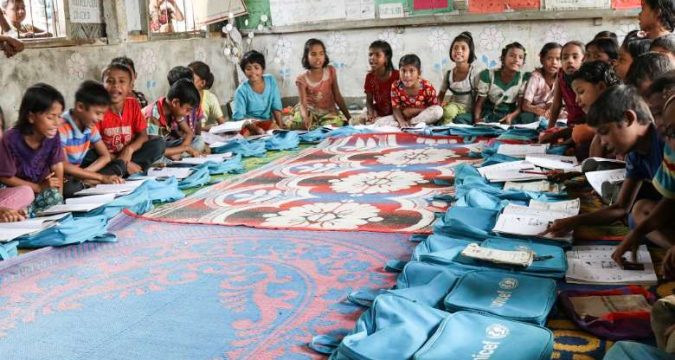
DHAKA (UCAN): Human Rights Watch [HRW] slammed the government of Bangladesh for to closing schools in Rohingya camps, calling the move a cruel and massive violation of the right to education, affecting some 400,000 school-age children, the agency said in a December 18 statement.
The decision was issued by the Refugee Relief and Repatriation Commissioner [RRRC] on December 13.
Several educational institutions were already shut down following calls by the Bangladeshi government to close community- and home-based schools—a move that was has labelled a massive violation of the right to education.
“Bangladesh’s decision to close schools for Rohingya refugee children violates the right to education on a massive scale,” said Bill Van Esveld, associate children’s rights director at HRW. “This cruel decision should be immediately reversed so that Rohingya children can get an education, which will be especially critical for their return to Myanmar when it is safe to do so.”
Since August 2017, more than 745,000 Rohingya refugees have fled outbreaks of violence and military operations in neighbouring Myanmar. There are more than 860,000 Rohingya refugees living in 34 camp settlements across the Ukhiya and Teknaf subdistricts of Cox Bazar, with over 55 per cent of them below the age of 18.
Following a massive scale-up at the start of the response, education sector partners currently provide services through more than 6,000 learning centres.
A 30-year-old Rohingya teacher, who runs a community school with 60 students in Cox’s Bazar, said an RRRC official visited on December 13 and forbade him to run the school.
“I used to teach primary education in the Myanmese language in my school, but I don’t know why the Bangladeshi government took such a decision. If our children are not educated, then their prospects will not improve,” the teacher said, speaking on condition of anonymity. He has been running his school for the last year without payment from any organisation.
Rohingya leaders say the government made the move because of the recent anarchy and conflicts in Rohingya camps. But they are campaigning to stop the closure of community-based schools.
A Catholic Church leader said the closure of community-based schools was not a solution to problems at camps but would further alienate the Rohingya.
“Home-based and community-based schools should not be closed. If the government thinks that some ideology is being pushed which is harmful to the country, then these schools can be placed under surveillance. Because many are teaching voluntarily, it is not bad,” Holy Cross Father Liton Hubert Gomes, secretary of the Catholic bishops’ Justice and Peace Commission said.
“The Rohingya are entitled to the right to education and if they are deprived of this right, then it can be as harmful for them as it is for us,” Father Gomes added.
Mohammad Shamsud Douza, RRRC additional commissioner, said they were not closing any schools but are ensuring a uniform education system in the refugee camps.
“Many educational institutions have grown up in the camps, such as madrasa schools. We are closing these. We want a universal education system,” Douza said.








